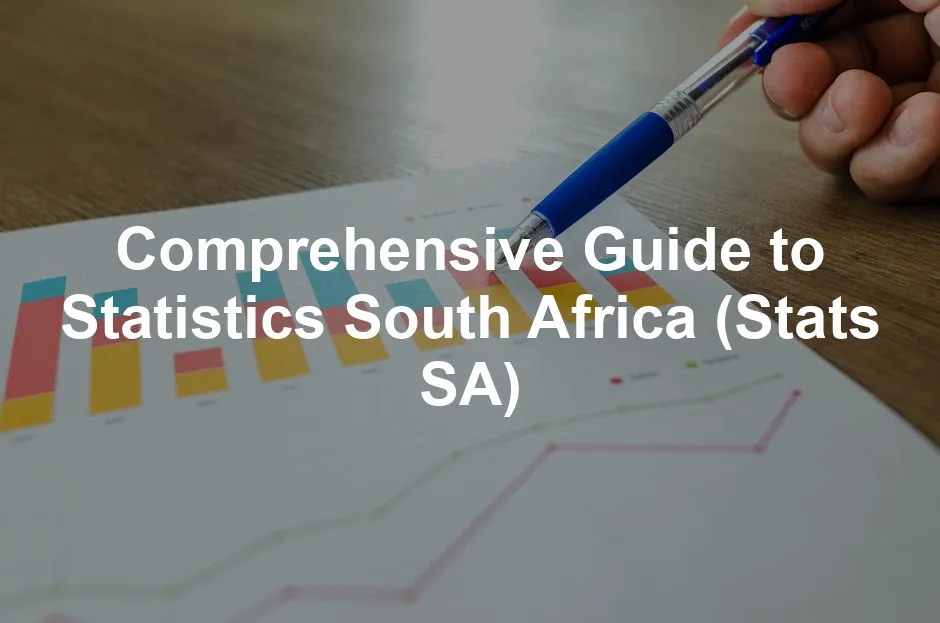Introduction
Statistics South Africa (Stats SA) is the backbone of reliable data in the nation. It plays a crucial role in shaping policies, understanding societal trends, and driving economic growth. Without accurate statistics, decision-makers would be navigating in a foggy landscape, unable to see the road ahead.
Imagine trying to make plans for a road trip without a map. You wouldn’t know where to go, which routes to take, or what to avoid. That’s how vital Stats SA is for South Africa. It provides essential data that helps the government, businesses, and citizens understand various aspects of life in the country.
Stats SA conducts various surveys and censuses, ensuring the data reflects the reality of South African society. From population demographics to economic indicators, the information generated aids in economic planning and promotes democratic governance.
Did you know that Stats SA conducts a national census every ten years? The last one was in 2022! This massive undertaking collects data from millions of households, allowing for a snapshot of the country’s demographics. Engaging with this information is not just beneficial; it’s necessary for anyone interested in South Africa’s growth and development.

Understanding Statistics South Africa
What is Statistics South Africa?
Statistics South Africa, often referred to as Stats SA, is the national statistical service responsible for producing and disseminating official statistics. Established to provide reliable data, it serves as a critical tool in advancing economic growth and fostering democracy.
Stats SA’s roots can be traced back to the Central Statistical Service, which was formed to unify the statistical efforts of South Africa’s various regions after the end of apartheid. Over the years, it has evolved significantly, absorbing the statistical services of former territories like Transkei, Bophuthatswana, Venda, and Ciskei.
The agency operates under the Statistics Act, 1999, which guides its objectives and ensures the integrity of the data it produces. Today, its primary functions include conducting regular censuses and surveys, providing demographic, economic, and social data that are indispensable for informed decision-making.
Speaking of informed decisions, if you’re in the market for enhancing your data analysis skills, check out “How to Measure Anything: Finding the Value of ‘Intangibles’ in Business” by Douglas W. Hubbard. This book will help you understand how to quantify what seems unquantifiable, which is essential for making data-driven decisions.
Stats SA’s current objectives focus on promoting economic and social development through accurate statistics. It aims to enhance the quality of data and ensure it reaches a broad audience. The agency is committed to transparency, making its data accessible to the public while maintaining high standards in data collection and management. This commitment helps build trust among stakeholders and supports effective policy formulation.
In summary, Stats SA is not just a data collector; it’s a vital partner in South Africa’s journey towards informed governance and social progress. By providing accurate and reliable data, it empowers citizens and leaders alike to make decisions that enhance the quality of life across the nation.

For more insights into the role of Stats SA in shaping policies, check out this article on Understanding Statistics South Africa.
Structure and Governance
Statistics South Africa (Stats SA) operates with a clear organizational structure. At the helm is the Statistician-General, currently Risenga Maluleke. He leads a team of dedicated professionals committed to providing accurate and reliable statistics. The hierarchy includes various directors responsible for different divisions, such as demographic and economic statistics. These key personnel play a crucial role in maintaining the integrity and dependability of the data produced.
The agency resides in Isibalo House, located in Pretoria. This central office serves as the nerve center of Stats SA’s operations. The Statistician-General is supported by a personal assistant and a spokesperson, ensuring effective communication both within and outside the organization. The streamlined structure promotes efficiency, enabling swift responses to the complex demands of data collection and analysis.
Stats SA operates under the Statistics Act of 1999. This legislation is foundational, guiding the agency’s objectives and ensuring the accuracy of the statistics produced. The Act empowers Stats SA to collect data from various sectors, safeguarding the confidentiality of respondents. It establishes a framework for statistical practice, ensuring that the data collected is both reliable and relevant to the country’s needs.
Are you looking to dive deeper into the world of statistics? “Naked Statistics: Stripping the Dread from the Data” by Charles Wheelan is a fantastic read that makes understanding statistics fun and engaging. It’s perfect for anyone wanting to demystify the numbers!
Additionally, the Act mandates that Stats SA maintains independence in its operations. This autonomy is vital for building public trust in the data provided. It allows for an impartial approach to statistical production, free from external influence. Overall, the structure and governance of Stats SA are designed to uphold its mission of advancing economic growth and fostering informed decision-making through reliable statistics.

Key Functions of Stats SA
Stats SA plays a pivotal role in the collection and dissemination of statistics through various censuses and surveys. Since its inception, Stats SA has conducted four major national censuses: in 1996, 2001, 2011, and most recently in 2022. Each census serves as a comprehensive snapshot of the country’s demographics, allowing for nuanced understanding and planning. These censuses gather data on population size, distribution, and key socio-economic indicators, essential for national development strategies.
Beyond censuses, Stats SA conducts numerous surveys, such as the Quarterly Labour Force Survey and the Community Survey. These surveys provide timely insights into specific areas, such as employment, health, and education. Each survey is meticulously designed to ensure the data is both accurate and reflective of the current socio-economic landscape.
Data collection methods employed by Stats SA are diverse and rigorous. They include face-to-face interviews, online surveys, and telephonic data collection. Each methodology is chosen based on the nature of the information needed and the target population. The importance of accurate data cannot be overstated; it forms the backbone of sound policy and decision-making. Flawed data can lead to misguided policies, impacting millions of lives.
For those looking to enhance their data analysis skills, consider picking up “The Art of Statistics: Learning from Data” by David Spiegelhalter. This book will guide you through the complexities of data analysis while making it accessible and enjoyable.
By employing rigorous methodologies and adhering to high standards, Stats SA ensures that the statistics produced are not only accurate but also valuable for a range of stakeholders. From government agencies to researchers and businesses, reliable data is crucial for informed decisions that drive economic growth and improve social welfare. Through its comprehensive approach, Stats SA demonstrates its commitment to transparency and accuracy in statistical reporting.

Economic Indicators
Importance of Economic Data
Economic data is like the pulse of a nation. It tells us how healthy or sick the economy is. Statistics South Africa (Stats SA) plays a crucial role in monitoring this pulse. By providing accurate and timely data, Stats SA helps everyone from policymakers to average citizens understand economic conditions.
Why is this important? Well, imagine trying to run a business without knowing your sales numbers. You’d be flying blind! Stats SA’s data helps businesses decide when to hire or invest. It also aids the government in crafting policies that reflect the current economic climate. The right data can lead to better job creation, infrastructure development, and social programs. Without it, we might as well be throwing darts in the dark!
Key Economic Reports
Among the key reports produced by Stats SA, the Quarterly Labour Force Survey (QLFS) stands out. This report provides insights into employment trends, unemployment rates, and labor market dynamics. It’s released every quarter, making it a timely source for understanding the job market.
The QLFS impacts policy-making significantly. For instance, if the data shows a spike in unemployment, government agencies may prioritize job creation initiatives. Conversely, if employment rates improve, they may focus on skills development to match market demands.
Another significant report is the Gross Domestic Product (GDP) data, which tracks economic growth. This data helps analysts gauge if the economy is moving forward or stagnating. It’s essential for investors, as it indicates the country’s economic health and potential for future growth.
Speaking of investments, if you’re looking for a way to track your health while you invest in your future, the Fitbit Charge 5 is a fantastic fitness tracker that helps you monitor your health metrics so you can make informed lifestyle choices.
In summary, Stats SA’s economic reports are fundamental for informed decision-making. They help illuminate the path forward, ensuring that policies align with the economic realities faced by South Africans.

Collaboration with Other Agencies
Partnerships
Stats SA doesn’t work in isolation. It collaborates with various government departments and agencies to improve data accuracy and relevance. One notable partnership is with the South African Police Service (SAPS) for crime statistics. This collaboration enhances the integrity of crime data, ensuring that it reflects the true state of safety in the country.
By aligning efforts with SAPS, Stats SA helps produce comprehensive statistics that inform public safety policies and resource allocation. This partnership exemplifies how collaborative efforts can lead to better governance and improved public services.
International Standards
Stats SA is committed to maintaining high standards in statistical practices. To achieve this, it aligns its methodologies with international statistical standards. This commitment ensures that the data produced is comparable globally. Whether it’s the UN’s Fundamental Principles of Official Statistics or guidelines set by the International Monetary Fund (IMF), Stats SA adheres to these frameworks.
By following international standards, Stats SA enhances the credibility of its data. This not only builds trust among stakeholders but also facilitates international comparisons. Researchers and policymakers can confidently use Stats SA’s data, knowing it meets rigorous global criteria.
If you’re interested in understanding the intricacies of data science, grab a copy of “Data Science for Business: What You Need to Know about Data Mining and Data-Analytic Thinking” by Foster Provost. This book will give you a solid foundation in data science principles that can greatly enhance your understanding of statistical data.
In conclusion, Stats SA’s collaborations and adherence to international standards underscore its commitment to producing reliable and comprehensive statistics. These efforts enhance the quality of data available for decision-making, ultimately benefiting South African society as a whole.

Online Resources
Official Website
Navigating the Stats SA website is a breeze! Head over to www.statssa.gov.za for a treasure trove of information. The homepage presents you with user-friendly menus, making it easy to find what you need.
Looking for specific data? Check the “Data” section! Here, you can access a variety of reports and publications, including the latest census results and economic surveys.
Need some visual flair? The “Visualizations” tab offers infographics that make complex data digestible. Stats SA also provides downloadable datasets for researchers and analysts. This ensures that you can work with the raw numbers without breaking a sweat.
Don’t miss the “Publications” section, where you can find annual reports, bulletins, and thematic analysis. These documents not only provide insights but also help you understand the context behind the statistics.
Data Portals
For researchers, the South Africa Data Portal is a game changer. This platform, powered by DataFirst, shares Stats SA’s data while providing metadata that simplifies research efforts. It’s like having a statistical GPS!
The portal offers access to various datasets, including the Quarterly Labour Force Surveys. This is crucial for understanding employment trends and labor dynamics in the country. By utilizing this resource, researchers can confidently analyze data and draw meaningful conclusions that inform policy and decision-making.
If you enjoy documenting your thoughts or findings, consider using a Moleskine Classic Notebook. This stylish notebook is perfect for jotting down insights or data points while you engage with the wealth of information available.
In summary, both the Stats SA website and the South Africa Data Portal are invaluable resources. They provide essential data and insights that empower researchers, policymakers, and the public.

Contact Information and Support
How to Reach Stats SA
Got questions? Stats SA is just a call or click away! You can reach them via phone at 012 310 8911. Prefer to put your thoughts in writing? Shoot them an email at info@statssa.gov.za.
If you want to visit in person, head over to Isibalo House, Koch Street, Salvokop, Pretoria. The postal address is Private Bag X44, Pretoria, 0001. They welcome inquiries and are eager to assist anyone seeking information.
For a more direct approach, you can contact the Statistician-General, Risenga Maluleke, at 012 310 2122 or email him at risenga@statssa.gov.za. His personal assistant, Malebese Sekgota, is also available for support.
Social Media Presence
Stats SA is not just about numbers; they’re also social! Follow them on Facebook and Twitter for updates, insights, and fun facts about statistics. These platforms serve as a bridge between the agency and the public, making statistical information more engaging.
Social media allows Stats SA to disseminate information rapidly. Whether it’s announcing new surveys or sharing infographics, they keep the public informed and involved.
In a world where social media reigns supreme, Stats SA embraces this trend, enhancing transparency and engagement. So, don’t be shy—like, follow, and engage with them to stay updated on all things statistics!

Case Studies of Statistical Impact
Statistics South Africa (Stats SA) plays a pivotal role in shaping policies through data. Numerous case studies illustrate how its statistics have influenced significant decisions.
One noteworthy example is the 2011 Census. The data collected revealed alarming trends in housing and urbanization. With over 60% of South Africans living in urban areas, the government recognized the urgency for improved infrastructure. This census data directly influenced the National Development Plan, which aimed to address housing shortages and service delivery issues.
Another impactful case is the Quarterly Labour Force Survey (QLFS). In 2020, the QLFS highlighted soaring unemployment rates due to the pandemic. The government used this information to implement emergency relief measures, including the Temporary Employer/Employee Relief Scheme (TERS). Thus, Stats SA’s data was crucial in mitigating the socio-economic fallout during a challenging time.
Public perception of statistics significantly affects policy implementation. Trust in data is essential. When the public believes in the accuracy of Stats SA’s statistics, they are more likely to support government initiatives based on that data. Conversely, skepticism can lead to resistance against well-intended policies. Maintaining transparency and consistent communication about data collection methods is vital for fostering public trust.
Stats SA has made strides in building credibility. By involving communities in surveys and ensuring confidentiality, they have strengthened relationships with the public. This trust is crucial for effective policy-making. Without it, even the most accurate statistics can fall flat, leading to a disconnect between government actions and public needs.
If you’re interested in a gripping read that showcases the real-world implications of data, check out “Bad Blood: Secrets and Lies in a Silicon Valley Startup” by John Carreyrou. This book dives into the fascinating world of data manipulation and its consequences.

Challenges and Future of Stats SA
Stats SA faces several challenges in data collection and reporting. One major hurdle is the digital divide in South Africa. Many rural and underprivileged communities lack reliable internet access, making data collection difficult. This gap can lead to incomplete datasets, skewing results and impacting decision-making.
Another challenge is the budget constraints faced by Stats SA. Despite its critical role, the agency often operates under tight financial limitations. This can hinder its ability to conduct comprehensive surveys and maintain staff levels necessary for effective data collection and analysis.
Looking ahead, Stats SA is committed to enhancing data accuracy and accessibility. One upcoming initiative involves the integration of technology in data collection processes. By adopting mobile applications for surveys, they aim to reach more respondents, even in remote areas. This technological shift will help bridge the digital divide and improve the quality of data.
Additionally, Stats SA plans to increase collaboration with academic institutions and civil society organizations. This partnership will help improve data literacy among the public, encouraging more people to engage with statistics and understand their significance.
For an effective way to manage your time while you delve into the world of data, consider using the Apple Watch Series 7. This smartwatch can help you stay organized and on track while you explore the vast landscape of statistics.
In conclusion, while Stats SA faces challenges, its proactive approach to overcoming them bodes well for the future. By embracing technology and fostering partnerships, the agency is set to enhance its role as a vital resource for accurate and reliable statistics in South Africa.

Conclusion
Statistics South Africa (Stats SA) is essential for the nation’s development. It provides accurate data that informs economic policies and social programs. Through comprehensive surveys and censuses, Stats SA captures the heartbeat of South African society.
Recapping the critical points, Stats SA has influenced major policies, from housing to employment. Its data-driven approach helps the government respond to current challenges effectively. Furthermore, building public trust in statistics is crucial for successful policy implementation.
As we look to the future, engaging with Stats SA’s resources is vital. Readers are encouraged to visit www.statssa.gov.za for up-to-date information, reports, and data that can inform personal and professional decisions. Supporting initiatives aimed at improving statistical practices will strengthen the foundation of reliable data in South Africa.
By championing accurate statistics, we empower ourselves and future generations to make informed choices. Let’s advocate for robust statistical practices, ensuring that Stats SA continues to thrive in its mission to serve the nation.
Before you go, if you’re looking for a little fun, why not check out the LEGO Creator Expert Roller Coaster Building Kit? It’s a great way to relax and unleash your creativity!
Please let us know what you think about our content by leaving a comment down below!
Thank you for reading till here 🙂
All images from Pexels




